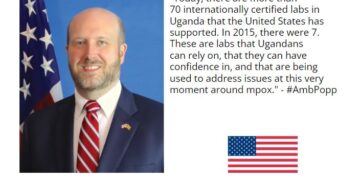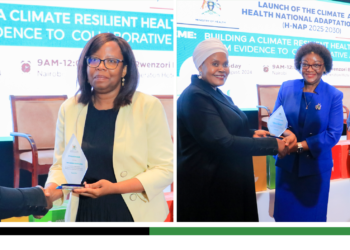Kampala, Uganda – On the heels of the commemoration of World Breastfeeding Week, a groundbreaking study conducted at Mbale Regional Referral Hospital in Eastern Uganda has unveiled crucial insights into the prevalence and reasons behind delayed initiation of breastfeeding among postnatal women.
Titled “Prevalence and Predictors of Delayed Initiation of Breastfeeding Among Postnatal Women at a Tertiary Hospital in Eastern Uganda,” the research, published in the esteemed Archives of Public Health Journal, shines a spotlight on the urgent need for interventions to address this pressing issue.
Led by a team of dedicated researchers from Busitem University, including Loyce Kusasira, David Mukunya, Samuel Obakiro, Kiyimba Kenedy, Nekaka Rebecca, Lydia Ssenyonga, Mbwali Immaculate, and Agnes Napyo, the study sought to explore the reasons behind the high rates of delayed breastfeeding initiation among Ugandan mothers.
What is Delayed Breastfeeding Initiation?
Delayed breastfeeding initiation refers to a situation where a newborn baby does not receive breast milk within the first hour after birth.
According to the World Health Organization (WHO) and UNICEF, early initiation of breastfeeding is recommended within the first hour of a baby’s life.
This crucial period immediately after birth is known as the “golden hour,” during which the baby’s sucking reflex and interest in feeding are typically at their peak.
Early initiation of breastfeeding offers numerous benefits to both the newborn and the mother. For the baby, breastfeeding during the first hour provides essential colostrum, often referred to as “liquid gold.”
Colostrum is the first milk produced by the mother, and it is rich in nutrients and antibodies that provide the baby with immunity and protection against infections and diseases.
It also aids in the development of the baby’s digestive system and establishes a strong foundation for future breastfeeding.
For the mother, early breastfeeding initiation stimulates the release of oxytocin, a hormone that helps the uterus contract, reducing the risk of postpartum bleeding.
It also supports bonding between the mother and the newborn, promoting emotional connection and a sense of security for the baby.
However, various factors can lead to delayed breastfeeding initiation. Some common reasons include medical interventions during childbirth, such as cesarean sections, or complications during labor, which may require immediate medical attention.
Additionally, cultural practices, lack of awareness about the benefits of early breastfeeding, and inadequate support for breastfeeding in healthcare facilities can contribute to delayed initiation.

The Study
The study which has been published in the prestigious Archives of Public Health Journal, the research involved 404 mother-infant pairs who were interviewed between July and November 2020.
The study used a structured questionnaire to gather information on socio-demographic, infant-related, labor, and delivery characteristics.
Mother-infant pairs were enrolled in the study between July and November 2020 at Mbale Regional Referral Hospital (MRRH), located in Mbale City, Eastern Uganda. MRRH is a general and teaching hospital for several medical and nursing institutions.
It has a 400-bed capacity and serves over ten neighboring districts in the Mbale sub-region as a referral hospital. These include Kibuku, Kween, Bududa, Busia, Kapchorwa, Budaka, Butaleja, Pallisa, Manafwa, Namisindwa, Butebo, Sironko, Bukwo, Bulambuli and Tororo.
The study’s key findings indicate that a significant 70% of mothers experienced delayed initiation of breastfeeding, signaling the urgent need for intervention and support. Several factors were identified as predictors of delayed breastfeeding initiation, and they include:
First, the study identified several key maternal characteristics that were linked to delayed breastfeeding initiation.
“Mothers who were single, received antenatal care less than three times, underwent a cesarean section, or had difficult labor were more likely to delay initiating breastfeeding,” the authors write.
Secondly, infant-related factors were identified as contributing to delayed breastfeeding initiation.
“Infants who experienced health issues at birth faced an increased risk of not receiving early breastfeeding,” the authors report.
Implications
The implications of these findings cannot be understated. Delayed breastfeeding initiation can lead to adverse health outcomes for both infants and mothers, as early breastfeeding provides essential nutrients, antibodies, and protective factors that fortify the infant’s immune system and foster maternal-infant bonding.
In response to these concerning findings, healthcare experts and policymakers in Uganda are mobilizing efforts to tackle the identified predictors and promote early breastfeeding initiation.
The study’s authors emphasize the importance of targeted interventions, particularly for women who undergo cesarean sections. They propose initiating breastfeeding support immediately after delivery, either in the recovery room or operating theater, to enhance early initiation rates among this group.
For instance, the Ministry of Health in Uganda has sent out an alert imploring citizens to take breastfeeding seriously.
“This is World Breastfeeding Week. Breastfeeding your baby within the first hour after birth helps build the body’s defense against infections and diseases and assures immediate bonding with the baby,” announced a ministry tweet this week.
Officials at the ministry added that education and awareness also play a pivotal role in driving positive change.
“Health education classes will emphasize the significance of regular antenatal care attendance and breastfeeding initiation, empowering mothers with essential knowledge for their and their infants’ well-being,” the officials say.
Importance of Early Breastfeeding
Breastfeeding within the first hour after birth has proven to be instrumental in providing newborns with essential nutrients, antibodies, and protective factors that help guard against various illnesses. As countries like Uganda continue their campaign for early breastfeeding initiation, healthcare authorities recognize its potential to save lives and enhance child development.
Prominent pediatrician Dr. Jane Nakalembe emphasizes that breast milk is nature’s best gift to newborns, containing a perfect blend of nutrients for optimal growth and development.
Studies have shown that breastfeeding within the first hour after birth can reduce neonatal mortality rates and protect infants from life-threatening illnesses like pneumonia, diarrhea, and malnutrition.
The benefits of breastfeeding extend beyond the physical aspect, as skin-to-skin contact during breastfeeding fosters emotional bonding between mother and child. This connection promotes cognitive development and emotional intelligence, laying a strong foundation for a healthy parent-child relationship.
In line with recommendations from the World Health Organization (WHO) and UNICEF, countries in the region actively promote breastfeeding as a cornerstone of infant and maternal health.
Local health facilities, community health workers, and breastfeeding support groups play essential roles in disseminating information and providing guidance to new mothers.
World Breastfeeding Week
As Uganda joins the world in celebrating World Breastfeeding Week, this study serves as a vital call to action for all stakeholders to prioritize early breastfeeding initiation. By implementing evidence-based support programs, raising awareness, and providing comprehensive care, Uganda can build a healthier future for its youngest citizens.
As the world celebrates World Breastfeeding Week, communities, healthcare experts, and governments in Uganda and the region are coming together to raise awareness about the vital benefits of breastfeeding.
This annual event emphasizes the significance of early initiation of breastfeeding, which not only builds infants’ defense against infections and diseases but also fosters an immediate bond between mother and child.
For more on this research, please visit: https://archpublichealth.biomedcentral.com/articles/10.1186/s13690-023-01079-2#Sec2













































